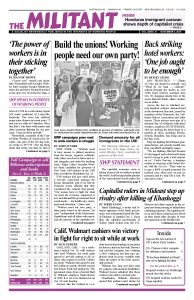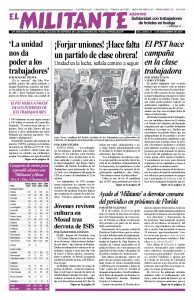PITTSBURGH — Carrying signs saying, “Hospital Workers Rising” and “UPMC: Respect Our Rights,” 100 hospital workers and supporters from the United Steelworkers and other unions carried the fight for a union to the heart of downtown Pittsburgh, the headquarters of the University of Pittsburgh Medical Center Oct. 4. The one-day strike by Service Employees International Union members put a spotlight on anti-union harassment by the medical center bosses.
The strike was the latest action in the workers’ three-year fight to organize UPMC, the largest private employer in western Pennsylvania. The multihospital company employs some 80,000 workers at sites across the state. Last year UPMC posted $1.3 billion in profits, and CEO Jeffrey Romoff made a salary of more than $6 million.
Strikers at the march said many of them make less than $15 an hour and a lot can’t afford their own health care. The hospital bosses say they plan to raise their minimum wage to $15 an hour by 2021. Ashley Smith, a cafeteria worker at UPMC Presbyterian, told the Pittsburgh City Paper how supervisors hound and harass workers, following them around while they’re trying to work.
When workers began to speak out about the conditions and that they wanted the union, the bosses retaliated. The National Labor Relations Board has cited the hospital with some 150 violations. In August, the NLRB ordered hospital officials to stop their pattern of unlawful surveillance, threats and intimidation.
The ruling also ordered the medical center to rehire workers they had illegally fired, pay them for lost time, stop anti-union activities and inform workers of their right to unionize. The union says the bosses have yet to implement the orders.
“Many of us are living at poverty level,” Ellie Lalonde, who works at UPMC Western Psychiatric Hospital, told the TribLIVE online paper at the protest. “We work in this system and provide health care, and yet we can’t afford to access it for ourselves — not without bills that are so outrageous that we avoid seeking out health care.”
“A union, to me, equals a voice,” Nila Payton, who works in the UPMC Presbyterian pathology department, told TribLIVE. “We’re focused on our goal to actually have a union within UPMC, and it seems like they’re fighting tooth and nail to keep that from happening. But it would work out for all of us if we had a union, I feel.”

